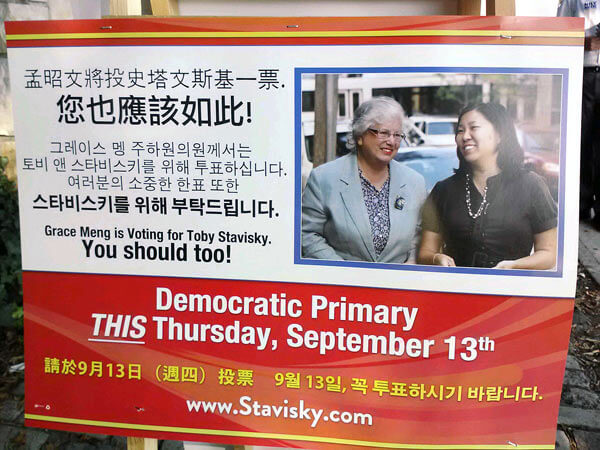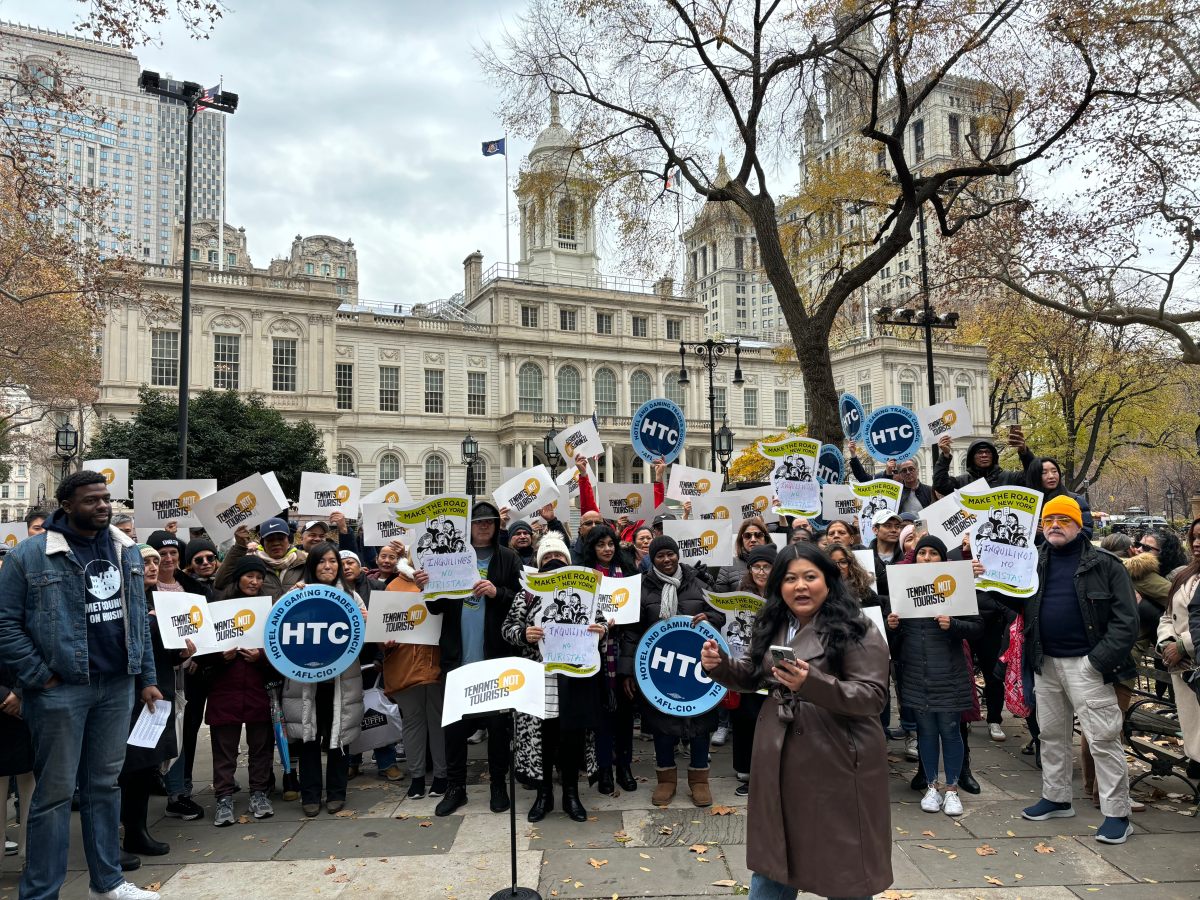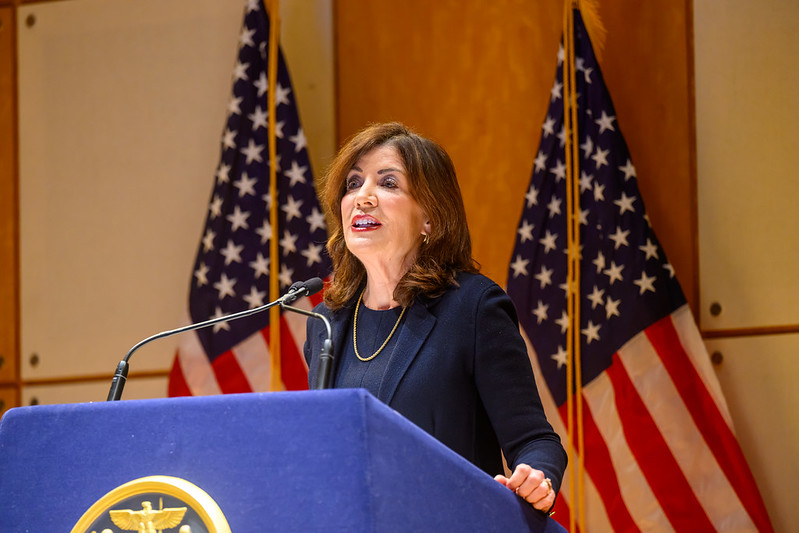By Joe Anuta
Candidates who want to make inroads with Mandarin-speaking voters must tread carefully when translating their names into Chinese, and strategies differ on how to be effective while avoiding unwanted connotations.
This election season mayoral hopefuls boast names that mean strong, plan, think, heroine, trustworthy or inclusive.
Others in the annals of the city’s political history are known by less auspicious monikers.
Transliterating a name from English to Mandarin is not an exact science, according to Jerry Vattamala, staff attorney at the Asian American Legal Defense and Education Fund.
For example, Gov. Andrew Cuomo’s name is referred to as “Ke Mo” in one Chinese-language daily newspaper and “Ge Mo” in another, according to one of many Mandarin-speakers interviewed for this story.
“That is why some jurisdictions say they don’t like to transliterate,” Vattamala said, referring to bodies like the city Board of Elections, which initially resisted coming up with Mandarin versions of candidates’ names in the early 1990s until it was required by federal law to do so.
Chinese names are typically two or three characters long, with the surname written first. But unlike letters of the English alphabet, the characters are not simply phonetic sounds. They each mean something. Standard transliterations exist for most English names, but many candidates want something more unique.
This malleability can bode well for politicians who are trying to sell certain images of themselves to the public, but it can also cause problems.
A candidate for a northeast Queens state Senate seat used a Chinese name pronounced “Chiang Ma Shi” to run in 2012. According to the hopeful, John Messer, the surname meant “strong;” followed by the character for “horse,” which he defined as the hardest-working animal; and finally the character for “gentleman.”
While he was correct, many Chinese speakers interviewed by TimesLedger said the name sounded strange and bore a striking similarity to the term for “aphrodisiac.”
Qin Qin McCarthy, a New York City-based translator and cultural consultant, said there are typically two schools of thought on the best way to transliterate a name.
“Some would prefer a transliteration so the Chinese name would sound as close to their English name as possible,” she said via e-mail.
Going this route, a candidate would be more likely to remember their own name and respond to it.
“Of course, they would pick the characters with more positive meaning, since there can be many different characters with the same sound,” she said.
For example, embattled mayoral candidate Anthony Weiner’s name is pronounced “way na,” which sounds like his English name, but is decidedly foreign to Mandarin speakers. The second character means “inclusive.” It was picked over a host of other words that share a phonetic sound, but would have had odd meanings, like “sodium” or “seize,” for example.
In the same vein, city comptroller candidate Eliot Spitzer’s name is pronounced “she bee tse,” which means “think,” “must” and “plan.”
Others would prefer to have a transliteration that sounds like a real Chinese name, according to McCarthy.
Council Speaker Christine Quinn’s (D-Manhattan) name, for example, is pronounced “ke quay ying” and sounds authentic. Former city Comptroller Bill Thompson’s name is pronounced “tung sheen.”
The idea is that voters may feel a closer connection to the candidate, McCarthy said, although city public advocate candidate Reshma Saujani’s name, pronounced “shao jah knee” and meaning “good girl,” seems to have covered both categories.
Another political operative suggested authentic names might be picked for an ulterior motive.
“It is a trick a lot of politicians will try to use to get some Chinese votes,” said the operative. “If those voters don’t know anyone, they will choose whoever is Chinese.”
But despite their authenticity, these picks don’t always go over so well with voters, according to Peter Tu, executive director of the Flushing Chinese Business Association.
Candidates can come across as insincere when they cannot remember their Chinese monikers during an event without a Mandarin-speaking staffer whispering a reminder in their ears.
But Tu added the meaning of a name does not mean that much in an election, since the immigrant community is well-informed and politically active.
“The Chinese community votes on what you have done in the past and what you will do in the future,” he said, adding that it is simply tradition to use auspicious characters in a name — Quinn’s Chinese name means “strong hero” or “heroine,” and Thompson’s means “trustworthy.”
And for all the fuss, English speakers do the same thing, according to Glenn Magpantay, director of the Democracy Program at the Asian American Legal and Defense and Education Fund, citing a host of names derived from fabled warriors or biblical figures.
Nobody is going to vote for a candidate simply based on a name, he said.
When Mark Green successfully ran for public advocate, he transliterated his last name to the Chinese character that means “green.”
“No Chinese person thinks Mark Green is a green man,” Magpantay said.
Reach reporter Joe Anuta by e-mail at januta@cnglocal.com or by phone at 718-260-4566.





































